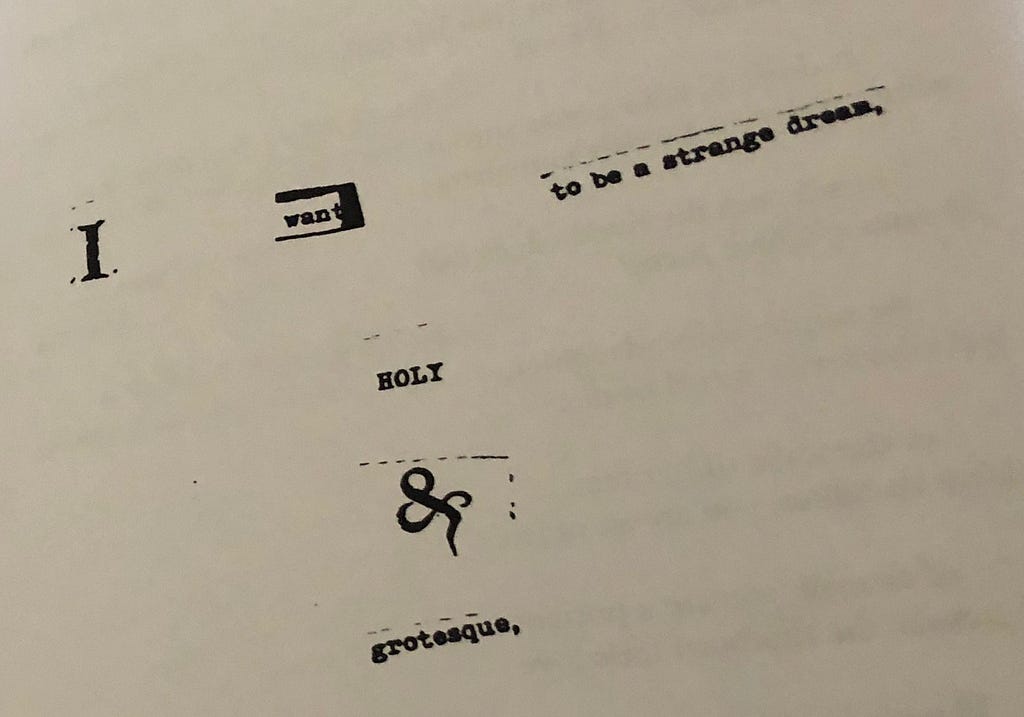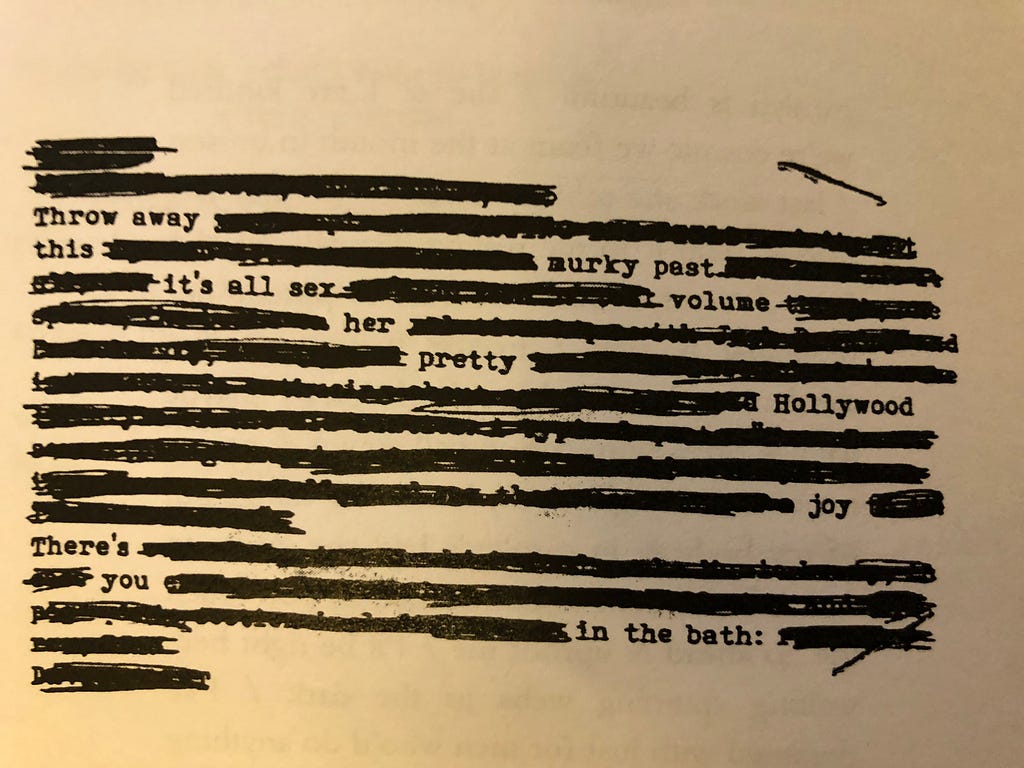
“let’s talk about the rifle. let’s talk
about the river inside it.”
Maggie Woodward’s Found Footage beckons you into its world, its “strange dream holy & grotesque” with this first poem of couplets and immediately establishes one of its main tensions: “the firstborn feels love / like it’s her blood, / screaming” (“OMEN”). The way we are made to feel can destroy us from the inside out.
In all my favorite horror movies, there are survivors — I like it when we’re left with at least someone standing, the “final girl,” or the family left waving white sheets in a pattern that reads “hello.” In any horrific event, there is someone, or something left.
Found Footage is about many things, and one of them is being left: “I don’t trust anyone or any cell to stay.” This little — small, dense, with a black textural cover and hand-stitched like something of the occult — book asks a lot of us as readers, namely, to place ourselves in the aftermath of many tragedies. Yes, there is a car crash, but there is also the tragedy of the body and how it can betray us, the tragedy of loving without reciprocation, or how even daily moments of living, of moving forward are, themselves, tragedies: “There are too many ways to leave a hole in the world,” (“[ONCE I WAS FERAL]”). There are so many ways to feel loss when you remain.
This chapbook is full of monsters — the lovers and friends that betray, the concrete villains — but I believe it engages much more deeply with horror than surface-level monsters. What is horror? The feeling of replaying a memory that’s not yours? Over and over and over in a non-linear infinity loop? In the chapbook’s central poem “ALL THE FOOTAGE FROM OCTOBER,” it’s always October: “& it was October. it’s October now,” “somewhere, someone thinks October is just like any other syllable of time.” That’s horror. The feeling that you need to stand there and watch it happen, that you cannot turn back time, that your lips will not say “fuck you” to the person that really deserves it? That’s horror. How terrifying is that feeling of being trapped, tied down, manipulated into something that’s not you. Then seeing that not-you in the mirror, that feeling of uncanny: “My mouth is always moving without my permission.” The most horrifying aspect of “you keep forcing me to define you by absence” is not the absence, but the “force.” In this way, the body acts as a central antagonist in Found Footage: “farewell to the me who was not afraid of men / now I cover my mouth when I’m full-body laughing,” (“PARASOMNIA”) and “My body was an airplane hangar My body a rotary phone Once a man ripped wire from my bra & he checked me into the psych ward” (“[ONCE I WAS FERAL]”).
Replaying memories that aren’t ours. Maybe that’s why some of us are so drawn to horror movies. Not as an escape, but a way to relate to levels of different trauma, a kind of empathy. Maybe that’s why we write them down in a book. It’s appropriate that Maggie peppers this book with images from famous horror movies, not just because she’s a film scholar of this particular genre, but because this is really how it works. Grief is not just grappling with our memories, but processing them through all the images/movies/idioms we consume. You can’t see absence, but you can see a specter floating across the room. You can feel loss through other bodies, even on-screen corpses.

One of the most striking aspects of Woodward’s poetry for me is the way she is able to bring me down to this broken-down vulnerable state, and then, a few poems later, lift me right back up hand in hand. “Once i was feral Once i attended my best / friend’s funeral.” Here the “i” is so small it could curl into the page. But then the mode will switch quickly, before any of us can wallow. Woodward surprises us again and again with moves like this acknowledgement: “so what i like watching people / kill people onscreen,” a moment of candid clarity that allows for a brief almost conversation with the reader. In these moments we are invited into Found Footage, and are in some ways granted the perspective and permission to move beyond a certain wreckage.
As much as this chapbook is full of the passive horror of watching bad things happen to you or to the ones you love, there is an equally strong desire to a desire to reach in and create change. There are plans being made for the future: “& I will witch / all wild things to my palms” (“DISTILLERY”). In the line “RUN, GIRL,” there is also the advice, to “RUN,” girl. The line “suppose i made every man i ever knew / swallow cells from my body’s center” centers on “i made,” a concrete reclamation of both mental and bodily autonomy (from “MERCURIAL RETROGRADE”). You made something happen. Found Footage is an especially fitting title when you think about the erasures in the chapbook — Woodward takes these found texts and makes them anew, makes them dance in the way she decides and controls.
I find it both incredibly moving and satisfying that this chapbook, though it does shift often between these modes of watching and participating, ends on movement: “all that digging brought a glow to my cheeks.” Alive. Because Found Footage is so much more than a little book about loss and abandonment — it’s a book about survival, a book continually writing towards survival like a living, breathing animal. The way we are made to feel can also be what saves us.

Recently, I watched Texas Chainsaw Massacre II with some friends, and though it’s probably one of the silliest and campiest movies I’ve ever seen, I’ll maintain that it’s underrated and downright empowering. In the film, the “final girl,” radio host Stretch, wields a chainsaw wearing her characteristic bejeweled jean cutoffs and boots, turning the blade towards her tormentors. I find this scene so incredibly beautiful, a kind of “damsel saves herself” moment in an otherwise sticky bloodbath. This same kind of autonomy is the deepest heart of Found Footage. It is the chainsaw, it is “the rifle with a river inside it,” and it asks you to wield it rightly:
“i have risen from the graves of our coalmining dead from the bourbon trail & i will not apologize”
“I like my women unhinged,” Review: Maggie Woodward’s FOUND FOOTAGE was originally published in Anomaly on Medium, where people are continuing the conversation by highlighting and responding to this story.
